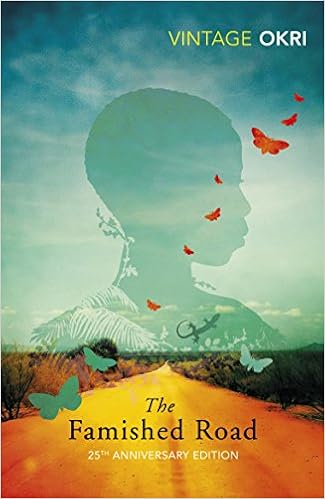Book #40: The Famished Road by Ben Okri

Number of pages: 512
This is the first in a trilogy of books set in Nigeria and, as I found when I finished it, was written in 1990, which might explain some of the less politically correct language (use of "midget" to describe a little person, for example).
At the start of the book, the narrator Azaro, a young boy, describes his near death experience, which resulted in his parents almost burying him, thinking he was dead. It seems to have resulted in him having the ability to see ghosts, so many of the chapters involve him communicating with spirits that are invisible to all of the other characters. He also apparently has the ability to enter other characters' dreams, and even talk to animals.
The story combines supernatural elements with realistic drama, including the family's domestic situation, much of which portrays Azaro's father as being violent and difficult - initially at least - to like, as he is shown threatening his family, and later on starting fights with other men. The book also introduces politics quite early on, mostly by having politicians canvassing and using threats to try and get people to support their party, although both the main parties seem to be somewhat corrupt.
The other main plot thread involves Azaro working at a bar, run by the enigmatic, and formidable Madame Koto, who also gets involved in the politics. It was hard to tell whether she was meant to be a likeable character, as she was often showing losing her temper with Azaro, and was also said to be a witch.
The supernatural elements mostly involve the spirits trying to get Azaro to come back to the spirit world, which he appears to make frequent visits to, and this is where the book becomes particularly bizarre, with writing that put me in mind of David Lynch, or the writing of George Saunders; for example one of the spirits is described as having his head upside down on his shoulders and a face that is jumbled up. I got the impression that Lewis Carroll was another influence on Ben Okri (at one point, a character fades away until only her smile remains). The book also throws in what I think was meant to be voodoo rituals in some places, mostly through attempts to drive the spirits away.
This book felt quite difficult at times, but I found it strangely compelling; it was certainly an unconventional novel, but I may well read the other two books in the trilogy at one point.
Next book: Looking Good Dead (Peter James)